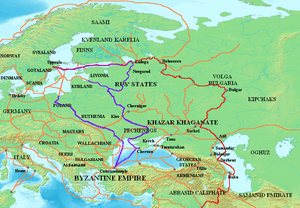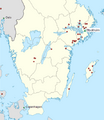Varangians facts for kids
The Varangians were a group of brave Vikings from Northern Europe. People in Greece and Eastern Europe called them Varangians or Varyags. These Vikings were not just warriors; they were also traders and explorers. Between the 9th and 11th centuries, they played a big role in shaping the history of Eastern Europe.
One of their most important achievements was helping to create the medieval state of Kievan Rus'. This powerful state was a big step in the history of what is now Russia and Ukraine. Varangians also served as special bodyguards for the emperors of the Byzantine Empire in a group called the Varangian Guard.
Contents
Who Were the Varangians?
The Varangians were Norsemen, which is another name for Vikings. They came from areas like modern-day Sweden, Norway, and Denmark. They were known for their strong ships and their skills in sailing. These skills allowed them to travel far and wide.
They were not just fighters. They were also smart traders. They traveled long distances to exchange goods with other cultures. They were also sometimes mercenaries, meaning they fought for money for other rulers.
Their Journeys and Trade Routes
The Varangians were amazing travelers. They used the many rivers and lakes of Eastern Europe to move around. They would sail their ships as far as they could on one river. Then, they would pull their boats over land to the next river. This was called a "portage."
These journeys created important trade routes. These routes connected Europe with rich Arab lands and the powerful Byzantine Empire. They traded things like furs, honey, and slaves for silver, silk, and spices.
One famous route was the "Trade Route from the Varangians to the Greeks." This route connected the Baltic Sea to the Black Sea and then to Constantinople, the capital of the Byzantine Empire.
Founding Kievan Rus'
A group of Varangians, known as the Rus', settled in a place called Novgorod around the year 864. Their leader was a man named Rurik. He became the first ruler of this area.
Later, in 882, Rurik's relative Oleg captured the city of Kiev. He then united the lands around Novgorod and Kiev. This created the state known as Kievan Rus'. The rulers of Kievan Rus' were from Rurik's family, called the Rurik dynasty. The name "Rus'" is where the name "Russia" comes from today.
Varangians and the Byzantine Empire
The Varangians were very interested in the riches of Constantinople, the capital of the Byzantine Empire. They sometimes attacked the city to try and get its wealth. These attacks led to several wars between the Rus' Varangians and the Byzantines.
However, the Byzantines also hired Varangians to be part of their special guard. This group was called the Varangian Guard. They were known for their loyalty and fierce fighting skills. They protected the Byzantine emperors for centuries.
Becoming Part of History
Over time, many Varangians who settled in Eastern Europe started to change. They learned the language and adopted the customs of the East Slavs, the people who lived there. Many of them also changed their religion. They went from believing in many gods (paganism) to following Orthodox Christianity.
By the end of the 11th century, the Varangians had mostly blended in with the East Slavs. Their unique culture became part of the larger culture of Kievan Rus'. They left a lasting mark on the history of Eastern Europe, especially in the creation of Russia.
Images for kids
-
Piraeus Lion drawing of curved lindworm. The runes on the lion tell of Swedish warriors, most likely Varangians, mercenaries in the service of the Byzantine (Eastern Roman) Emperor.
-
Nicholas Roerich: Guests from Overseas (1899)
-
Viktor Vasnetsov, The Invitation of the Varangians: Rurik and his brothers arrive in Staraya Ladoga.
-
Ship burial of a Rus chieftain as described by the Arab traveler Ahmad ibn Fadlan who visited Kievan Rus' in the 10th century, painted by Henryk Siemiradzki (1883)
-
Varangian Guardsmen, an illumination from the 11th-century chronicle of John Skylitzes.
See also
 In Spanish: Varego para niños
In Spanish: Varego para niños
 | George Robert Carruthers |
 | Patricia Bath |
 | Jan Ernst Matzeliger |
 | Alexander Miles |









